Personality DefinitionIntroductionPersonality refers to enduring psychological and behavioral characteristics that distinguish individuals. It encompasses traits such as emotions, thoughts, behaviors, and social interactions that are unique to each person and stable over time. Personality is shaped by genetic and environmental factors and influences how a person perceives, thinks, and responds to the world. 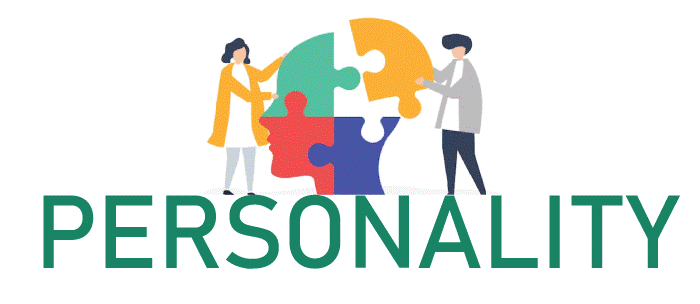
Assessment of PersonalityThe study of personality has a long and rich history, with the earliest roots of modern personality psychology dating back to the ancient Greeks. People who score high in conscientiousness are often considered reliable and hardworking. They tend to be well-organized and goal-oriented and are often described as dependable and responsible. People who score high in extraversion are often regarded as outgoing and friendly. They enjoy being around others and constantly seek out new experiences and challenges. Agreeableness refers to traits such as kindness, cooperativeness, and empathy. People who score high in agreeableness are often considered easy-going and considerate.They tend to be cooperative and empathetic and often put the needs of others before their own. Neuroticism refers to traits such as anxiety, moodiness, and insecurity. People who score high in neuroticism are often considered sensitive and prone to stress and anxiety. They tend to experience negative emotions more frequently and with greater intensity than others. In addition to the Five-Factor Model, other theoretical frameworks include the Trait Theory, which posits that personality comprises several essential traits consistent across situations and time.On the other hand, the Social-Cognitive Theory emphasizes the role of cognitive processes and schemas in shaping character. Many different methods are used to assess personality, including self-report measures, behavioral observations, and physiological measures. Self-report measures are the most widely used and consist of questionnaires or inventories that ask individuals to rate themselves on various personality traits. Behavioral observations involve observing an individual's behavior in a specific context. At the same time, physiological measures use physiological indicators such as heart rate and brain activity to infer information about an individual's personality. Personality PredictionUnderstanding personality can have important implications for various fields, including psychology, education, business, and medicine. For example, personality can predict job performance, identify individuals at risk for mental health problems, and design educational interventions tailored to an individual's needs and strengths. Therefore, personality is a complex and multifaceted construct that encompasses many traits and behaviors. It is shaped by genetic and environmental factors and influences how individuals perceive, think, and respond to the world. The study of personality is an important and fascinating field with important implications for many areas. Personality is relatively stable over time; while personality can change throughout a lifetime, it tends to be relatively stable from adolescence through middle age. 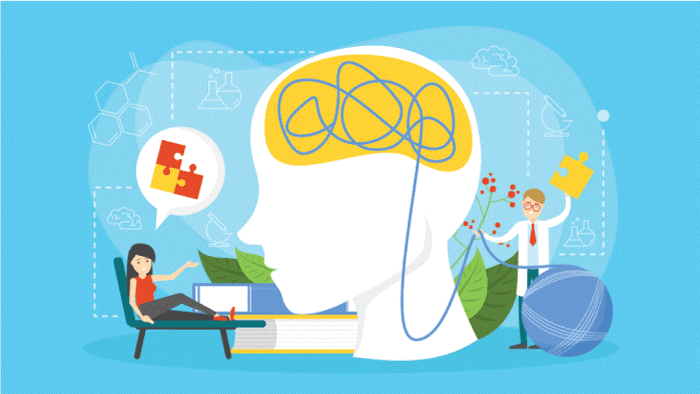
Personality traits are often consistent across a wide range of situations. For example, people who grow up in supportive and nurturing environments are more likely to develop higher levels of agreeableness and conscientiousness. In comparison, those who grow up in abusive or neglectful environments may be more likely to create higher levels of neuroticism. Personality TheoriesSome of the most influential theories of personality are 1. Psychoanalytic TheoryAccording to this theory, personality is divided into three parts, namely the id (the primitive, unconscious part of the personality), the ego (the rational, conscious part of the personality), and the superego (the moral and ethical part of the personality). The interplay between these three parts determines an individual's behavior and thoughts. According to Freud, unconscious conflicts and desires can emerge from dreams, slips of the tongue, and other unconscious behaviors. In this view, mental disorders result from a breakdown in the dynamic balance between the id, ego, and superego. Critics of this theory argue that it lacks empirical evidence and is overly focused on sexual and aggressive drives. 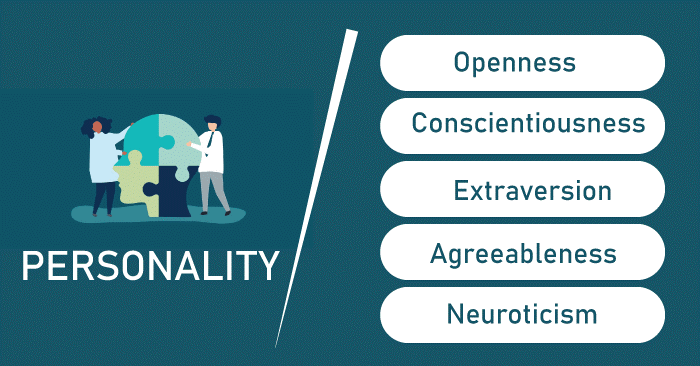
2. Trait TheoryThis theory views personality as a set of stable and enduring traits or characteristics that define an individual. According to this theory, personality traits are innate and largely determine behavior. The most well-known trait theory is the Five Factor Model, which identifies five broad characteristics: extraversion, agreeableness, conscientiousness, neuroticism, and openness. Trait theorists believe that individuals have a relatively stable set of characteristics influencing their behavior across different situations. The Big Five Personality Traits (extraversion, agreeableness, conscientiousness, neuroticism, and openness) are the most widely accepted and researched model of personality traits. Critics of this theory argue that it oversimplifies the complexity of personality and fails to capture the dynamic nature of human behavior. 3. Humanistic TheoryThis theory emphasizes the importance of an individual's subjective experiences and personal growth. According to this theory, individuals have an innate drive towards self-actualization and can grow and change throughout their lives. This theory was developed by Abraham Maslow and Carl Rogers, who emphasized the importance of self-awareness and self-acceptance in personality development. This theory strongly emphasizes the importance of empathy, self-awareness, and self-acceptance in personality development. Critics of this theory argue that it is too optimistic and idealistic and fails to fully acknowledge the influence of external factors on personality development. 4. Social Cognitive TheoryThis theory views personality as a product of innate characteristics and environmental factors, such as upbringing and social experiences. According to this theory, individuals learn about themselves and others through their interactions with the environment and develop their personality through self-reflection and self-evaluation. This theory views personality as a product of innate characteristics and environmental factors. This theory strongly emphasizes social learning and comparison's role in personality development. Critics of this theory argue that it fails to fully acknowledge intrinsic factors role in personality development. 5. Biological TheoryThis theory views personality as primarily determined by biological factors such as genetics and brain structure. According to this theory, individual personality differences are mainly determined by differences in genetics, brain structure, and neurochemistry. This theory has been supported by research on twin studies and brain imaging, which have demonstrated the role of genetic and biological factors in personality development. Critics of this theory argue that it oversimplifies the complexity of personality and fails to fully acknowledge the role of environmental factors in personality development. 6. Attachment TheoryAttachment theory is a psychological theory that focuses on the emotional bonds that form between individuals, particularly between infants and their primary caregivers. According to this theory, early attachment experiences can significantly impact personality development. They shape an individual's expectations and beliefs about relationships and their ability to form secure attachments with others. 7. Social Learning TheorySocial learning theory is a psychological theory that focuses on how individuals learn from observing and imitating the behaviors of others. This theory posits that individuals are exposed to various models or individuals whose behavior is imitated. These models can impact personality development by shaping an individual's attitudes, values, and behaviors. Each of these theories offers a unique perspective on the formation and structure of personality and contributes to our understanding of this complex concept. However, it is essential to note that no single theory can fully explain the complexity of personality, and many psychologists believe combining different theories is necessary to fully understand personality development and structure. Regardless of the specific theory, the study of personality has important practical implications. 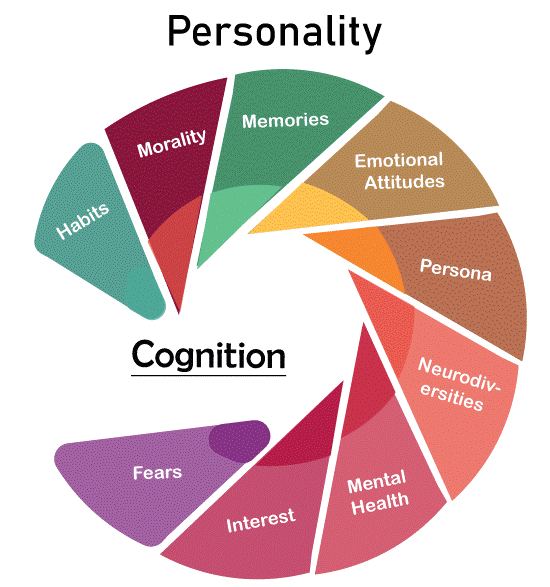
Understanding an individual's personality can help predict their behavior and help them understand themselves better. It can also help individuals identify their strengths and weaknesses and work towards personal growth and improvement. The study of personality is a complex and ongoing field of inquiry, and various theories have been developed to explain its formation and structure. While no single idea can fully explain the complexity of personality, combining different approaches is necessary to fully understand this critical aspect of human behavior. What Plays a Role in Developing a PersonalityCulture and environment play a role in shaping personality, while genetics are essential in determining character. Environmental factors, such as family, friends, and cultural experiences, can also play a significant role. Personality can affect mental and physical health. Personality has been linked to several psychological and physical health outcomes. For example, people who score high in neuroticism are more likely to experience anxiety and depression. In contrast, those who score high in extraversion tend to have better overall physical and mental health. 
Personality can influence relationships, and personality can also significantly impact interpersonal relationships. For example, people who score high in agreeableness tend to have better relationships with others. In contrast, those who score high in neuroticism may have more difficulty forming and maintaining close relationships. Personality refers to the unique patterns of thoughts, feelings, and behaviors that define an individual. It is a complex concept that psychologists have studied for centuries, and various theories have been developed to explain its formation and structure. Factors That Affect PersonalityIt's important to note that while each of these theories provides a unique perspective on the formation and structure of personality, many psychologists believe that a combination of different theories is necessary to understand this complex concept fully. Additionally, new research and advancements in technology may lead to new or modified theories of personality in the future. Personality refers to the distinctive characteristics, traits, and patterns of thought, feeling, and behavior that define individuals and distinguish them from others. Personality is shaped by a combination of genetic, biological, social, and environmental factors, and it influences how an individual interacts with the world and responds to different situations. In this article, we will examine the various factors that contribute to personality development and how these factors interact to shape an individual's unique personality. 1. Genetic FactorsResearch has shown that genetics plays a significant role in shaping an individual's personality. While genetics provides a foundation for personality development, it is not the only factor at play. Studies of identical twins raised apart have demonstrated a vital genetic component to personality traits such as extraversion, neuroticism, and conscientiousness. Additionally, research on the genetic basis of personality has identified specific genes associated with certain personality traits. 2. Biological FactorsThe structure and function of the brain also play a role in shaping personality. For example, research has shown that differences in the activity of specific brain regions can be associated with differences in personality traits such as impulsiveness and novelty seeking. Additionally, changes in brain chemistry, such as changes in neurotransmitter levels, can influence personality development. 3. Social FactorsSocialization and social experiences are essential factors in personality development. These experiences shape an individual's self-concept, beliefs about themselves and others, and attitudes and values, all of which are components of personality. Children learn about themselves and others through interactions with family, peers, and other socializing agents such as schools and media. For example, children learn about themselves and others by observing and imitating the behaviors of others, receiving feedback from others about their behavior, and internalizing social norms and values. 4. Environmental FactorsThe environment in which an individual grows up can also shape their personality. For example, the level of stress in the family environment, the availability of emotional support, and the degree of exposure to trauma or abuse can all impact an individual's personality development. Additionally, experiences such as cultural, economic, and educational opportunities can also shape personality by influencing an individual's values, goals, and aspirations. 5. Life ExperiencesAs individuals progress through life, they encounter new experiences and challenges that shape their personalities. For example, major life events such as a child's birth, a loved one's death, or achieving an important goal can impact personality development. Additionally, individuals can engage in activities and experiences consistent with their personality traits, further reinforcing and amplifying these traits over time. 6. Cognitive Development FactorsCognitive development refers to the changes in an individual's thinking, reasoning, and perception over the lifespan. This development can impact personality development by shaping an individual's beliefs, attitudes, and decision-making strategies and influencing their ability to understand and regulate emotions and behaviors. 7. Temperament FactorsTemperament refers to a set of biologically based personality traits that are evident early in life and tend to be relatively stable over time. These traits include characteristics such as shyness, activity level, and emotionality. They can play a role in shaping personality development by providing a foundation of personality traits that are relatively resistant to change. 8. Self-esteem FactorsSelf-esteem refers to an individual's overall evaluation of their worth and abilities. Research has shown that self-esteem can play a role in personality development by shaping an individual's sense of self-worth, ability to form and maintain positive relationships, and resilience in the face of adversity. 9. Cultural FactorsCulture also plays a role in shaping personality development. Cultural values, beliefs, and practices can influence the types of experiences that individuals have and the types of individuals they interact with, which can, in turn, shape their personality traits and behaviors. Additionally, cultural differences in attitudes towards personality traits such as achievement, autonomy, and individualism can influence personality development across different cultural groups. 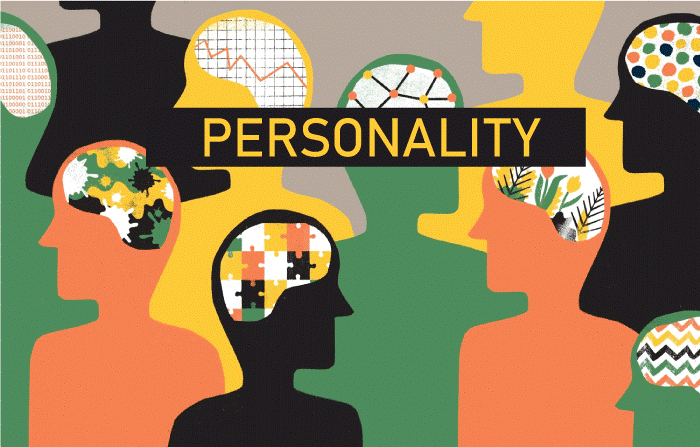
It's important to note that personality development is not linear and that individual personality differences can change over time. Additionally, personality development can be influenced by various factors, including individual differences in temperament, cognitive development, and life experiences. However, despite the complexity of personality development, research has shown that individuals tend to maintain relatively stable patterns of behavior over time, suggesting that a solid underlying structure to personality persists over the lifespan. ConclusionIn conclusion, personality development is a complex and dynamic process shaped by genetic, biological, social, and environmental factors. Understanding the various factors contributing to personality development is essential for understanding why individuals behave in specific ways and developing interventions to support individuals struggling with personality-related issues. While there is still much to be learned about the mechanisms underlying personality development, ongoing research in this field holds promise for improving our understanding of this complex and fascinating aspect of human psychology. It's also important to note that the process of personality development is ongoing and dynamic and that individuals can continue to develop and change throughout their lifespan. Additionally, personality development is influenced by a wide range of factors, including individual differences and contextual factors, such as the environment in which an individual grows up. However, despite the complexity of personality development, research has shown that individuals tend to maintain relatively stable patterns of behavior over time, suggesting that a solid underlying structure to personality persists over the lifespan.
Next TopicPolynomial Definition
|
 For Videos Join Our Youtube Channel: Join Now
For Videos Join Our Youtube Channel: Join Now
Feedback
- Send your Feedback to [email protected]
Help Others, Please Share









